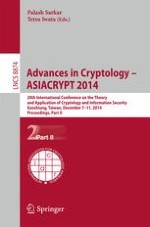2014 | OriginalPaper | Buchkapitel
Black-Box Separations for Differentially Private Protocols
verfasst von : Dakshita Khurana, Hemanta K. Maji, Amit Sahai
Erschienen in: Advances in Cryptology – ASIACRYPT 2014
Verlag: Springer Berlin Heidelberg
Aktivieren Sie unsere intelligente Suche, um passende Fachinhalte oder Patente zu finden.
Wählen Sie Textabschnitte aus um mit Künstlicher Intelligenz passenden Patente zu finden. powered by
Markieren Sie Textabschnitte, um KI-gestützt weitere passende Inhalte zu finden. powered by
We study the maximal achievable accuracy of distributed differentially private protocols for a large natural class of boolean functions, in the computational setting.
In the information theoretic model, McGregor et al.[FOCS 2010] and Goyal et al.[CRYPTO 2013] demonstrate several functionalities whose differentially private computation results in much lower accuracies in the distributed setting, as compared to the client-server setting.
We explore lower bounds on the computational assumptions under which this accuracy gap can possibly be reduced for two-party boolean output functions. In the distributed setting, it is possible to achieve optimal accuracy, i.e. the maximal achievable accuracy in the client-server setting, for any function, if a semi-honest secure protocol for oblivious transfer exists. However, we show the following strong impossibility results:
For
any
general boolean function and fixed level of privacy, the maximal achievable accuracy of any (fully) black-box construction based on existence of key-agreement protocols is at least a constant smaller than optimal achievable accuracy. Since key-agreement protocols imply the existence of one-way functions, this separation also extends to one-way functions.
Our results are tight for the
AND
and
XOR
functions. For
AND
, there exists an accuracy threshold such that any accuracy up to the threshold can be information theoretically achieved; while no (fully) black-box construction based on existence of key-agreement can achieve accuracy beyond this threshold. An analogous statement is also true for
XOR
(albeit with a different accuracy threshold).
Our results build on recent developments in black-box separation techniques for functions with private input [1,16,27,28]; and translate information theoretic impossibilities into black-box separation results.
